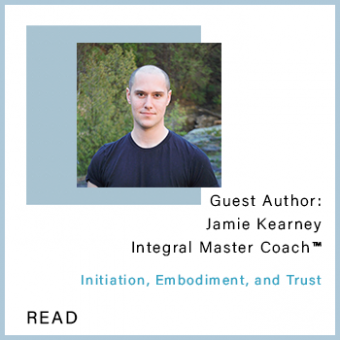Blog

“I've rarely experienced a 'training' program that so effectively combines rigorous methodology with generous heart. I now have a living compendium of precise, relevant practices.”
“Working with Joanne and Laura has been transformational at many levels of my life. Through their Integral Coaching® training, I have come to understand what “being human” means.”
“Integral Coaching Canada provides what we believe is the most complete and comprehensive coaching program available. ”

Initiation, Embodiment, and Trust
Jamie is a change agent and healing artist living in Burlington, Vermont. He offers Coaching, Holistic Bodywork, and Meditation Instruction to help people uncover the innate wisdom and power of their bodies and minds. By working with Integral Coaching Canada’s profound methodology, he strives to help people uncover their deepest gifts and translate them into meaningful action.
In contemplating what I received from my training with Integral Coaching Canada, these three words came to mind: Initiation, Embodiment, and Trust.
In his excellent work, “Immunity to Change,” Robert Kegan identifies two fundamentally different types of change: technical and adaptive. Technical change involves learning a new skill or new information. While this type of learning may be challenging and rewarding, it does not require us to change our identity. Adaptive change, on the other hand, requires that our entire sense of self, our habits, beliefs, and expectations, must transform in order to effectively respond to new life conditions. For example, a manager who focuses most of her attention on effective project management and delegation finds out that several employees are about to quit because of deep emotional and interpersonal tensions in the organization. In this situation, simply reading a manual or using a flowchart to try and make a technical change toward more effective conflict resolution will probably not help. Her effectiveness in this situation depends on making an adaptive change in her ability to ask powerful questions, and to be vulnerable with her employees in ways that may be alien to her current way of being.
Integral Coaching Canada’s coaching methodology supports people in this adaptive process through the deep listening, evocative metaphors, developmental objectives within the container of a developmental coaching process. As Integral Coaches™ we share these tools with our clients in cycles of conversation and practice, which also helps us to build rich and meaningful relationships with them. I liken this process to an initiation or rite of passage. A client who chooses to invite change into their lives often finds themselves thrown into a strange wilderness, confronted with surprising and challenging experiences. The Integral Coaching® process provides the ritual elements that support someone in stepping outside of what they’ve always known and facing the depth of their fears and desires in the process. Each conversation, each practice, supports them in confronting their insecurities and discovering hidden strengths.
For example, I had a client who wanted to find a more meaningful and satisfying career. During our conversations, she quickly discovered that she had often compromised her own desires and passions in order to emotionally support the people close to her. Pursuing more meaningful work meant facing the threat of letting people down or being judged as selfish, both of which frightened her. She didn’t just have to face this fear once, she faced it every time she practiced saying no to someone or pursuing a personal goal. But each cycle of development also supported her in making new meaning out of these situations, in becoming more familiar with the skills involved in self-advocacy. By the end of our work together, she had access to a brilliant sense of humor, strength, and clarity about her goals which came directly from leaning into her fears.
As an Integral Coach™, I don’t make this initiation happen for my clients, I do my best to facilitate it. I use the ICC Method to keep the rhythm of conversation flowing, and I reassure them that they can face the disruption that can accompany changes in their behavior. My capacity to hold this space depends on me doing my own developmental work, and fully trusting the power of my client and their process.
ICC’s Master Coach Training (Module 3) encourages complete embodiment in the Method. This requires that each element of the coaching process arise from our bodies and hearts, as well as our minds. After a session of assessment and design work, our teachers would frequently invite us to let go of all the structure and simply rest in an open state. By doing this, we allowed all the details of the design work to coalesce into something alive. The insights and creative breakthroughs that happened in these moments often surprised me and ended up being the most valuable perspectives that I would later share with my clients. As long as the method is cognitive, the insights don’t flow in this way. I remember spending hours trying to come up with a program for a client, struggling to get that aha moment to happen, before finally giving up. Defeated, and aware that something fundamental was missing. I ran a bath, lay down in the hot water, laughed at myself, and the insight I’d been fighting for hit me like a freight train.
As much as I value these experiences, I’ve also learned that even an embodied capacity for insight has little merit on its own. Deep trust in each client’s ability to discover their own answers must come first. I received a beautiful lesson in this during my final certification process. I had “performed” very well in the program up to this moment, and I expected to sail through the certification with relative ease. Then my teachers presented me with a brilliant, devastating invitation: “During this session today, let your client shine, trust her wisdom.” Everything went smoothly until I offered her the program I had designed based on our intake. I could tell that one of the metaphors wasn’t landing and that in that moment, she was inviting me into the unknown to discover her wisdom and depth.
I found myself unwilling to follow through on my commitment to let go of my plans and creative solutions. I got defensive, trying to explain why I thought the metaphor was a good fit. I felt fear at the thought of letting go of the structure of the session. How could I cover everything I needed to cover for my certification and also spend time reinventing this metaphor with her in the moment? Fortunately, my client was very generous with me, and we got through these rough spots to a place of mutual understanding and value. But I knew I had missed an essential opportunity because of my refusal to let go of the script.
Years have passed since that day, and I’ve fortunately had many opportunities to let my clients lead. Nonetheless, I think of that moment often, and I’m grateful for having my lack of trust witnessed in such a complete way. I think of this fundamental trust in my client as the last door to being an embodied coach. It’s not a door that I can step through once, but one that I have to enter each time that I connect with my clients. Confidence in their knowledge and capacity transforms my body and mind into a field of responsiveness. Then a simple conversation between two humans can become an initiation into adaptive change and a new way of being.

In support of continuing to cultivate and deepen my capacities in the areas discussed in this article, I regularly engage in a practice which I call “Dropping the Script.” I draw upon this practice in any situation where I want to communicate something that I’ve spent time ruminating on. It involves choosing a moment to pause with the person I’m speaking with and letting go of my story, agenda, and planned statements. I rapidly shift my awareness to tuning into the sensations of my feet and hips, the foundation of my body. Followed by taking a deep breath, and feeling my belly expand as the breath moves into my chest, I then bring my awareness into my heart and just notice what sensations are alive there. At this point, I’ll move my awareness back outside of my body and into my sense of connection with them. As I feel the somatic connection between us, I will let my mind rest in a receptive and curious state, and allow the next words I speak to emerge directly from the feeling in my heart. This can happen over the course of a few seconds, or if I tell someone that I need a moment to respond, I may take a bit longer. If I don’t know what to say, that can be my honest embodied response. Usually, if I give my body room to speak, a surprising question or insight will emerge that opens both of us up.
I invite you to play with this practice in your life and see what it offers you in support of cultivating adaptive change. If any aspect of what I’ve written seems too subtle or complex to use, you can always use the simple intention to connect with your body while in conversation. I hope that what emerges from this intention brings you greater fulfilment and confidence in your own inner wisdom, and the wisdom of the beings around you.










